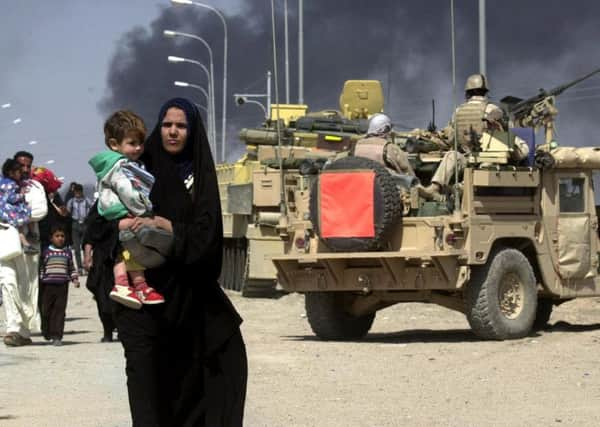Chilcot report: UK's secret deal with Iraqi militia was '˜humiliating'


The Chilcot Report details how ministers agreed to the release of detainees suspected of involvement in the killing of British personnel in return for a reduction in attacks on their main base in the city.
“It was humiliating that the UK reached a position in which an agreement with a militia group which had been actively targeting UK forces was considered the best option available,” Sir John said.
Advertisement
Hide AdAdvertisement
Hide AdBy the summer of 2007, Basra Palace – centre of British operations in southern Iraq – was described as the “most heavily mortared and rocketed place in Iraq”.
In August of that year, the government – led by Gordon Brown – concluded that troops had no choice but to withdraw to the relative safety of the air base outside the city.
The report discloses that, behind the scenes, British officials were negotiating with a senior figure in Moqtada al Sadr’s notorious Shia militia, the Jaish al Mahdi (JAM).
At one meeting, the figure – identified in the report only as JAM1 – demanded the release of four “higher risk” detainees, two of whom were suspected of involvement in the deaths of British personnel in return for a reduction of violence.
Despite the “scepticism” of many in both the British and US military, the deal was agreed by defence secretary Des Browne.
“As this is the only currently available plan to try and trigger a step change in the security dynamics in Basra, there is a good case for proceeding: there is no way radically to change the position on the ground without accepting some risks,” one official noted.
Following their release, two of their detainees gave interviews to local radio in which one of the men disclosed that they had been freed as the result of a ceasefire agreement.
British officials had to contact JAM1 asking him to intervene with the former detainees to urge them to “exercise discretion” in their public comments.
Advertisement
Hide AdAdvertisement
Hide AdThe report also reveals that Mr Brown was “worried” about the US reaction to the decision to withdraw from Basra Palace.
While the ceasefire meant they were able to complete the pull-out with no serious injuries, one US officer complained that Britain’s leaders had “abdicated” responsibility for the city’s security.
The report also concluded that Britain’s planning for its occupation of four provinces in south-eastern Iraq following the 2003 war was “wholly inadequate”. And the report rejected former prime minister’s Tony Blair’s argument that the threat of armed insurgency causing instability following the invasion could not have been known in advance.
Sir John Chilcot found that information available to ministers gave a “clear indication” of the risks associated with the occupation, including extremist violence, inadequate US planning and British failure to influence it, and a lack of international assistance without a UN resolution backing the invasion.
He concluded: “The government, which lacked both clear ministerial oversight of post-conflict strategy, planning and preparation, and effective co-ordination between government departments, failed to analyse or manage those risks adequately.
“Mr Blair, who recognised the significance of the post-conflict phase, did not press President Bush for definite assurances about US plans, did not seek advice on whether the absence of a satisfactory plan called for reassessment of the terms of UK engagement and did not make agreement on such a plan a condition of UK participation.”
Mr Blair gave evidence to the inquiry that it was not possible to foresee at the time of the invasion Iraq’s post-war collapse into sectarian violence, much of it stirred up by neighbouring Iran and al Qaeda.
But Sir John said: “We do not agree that hindsight is required.”